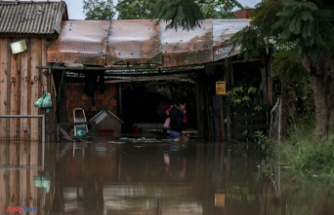Flood catastrophes like the one in the Ahr valley a year ago are just one of many signs that extreme weather events caused by climate change are becoming more common in Germany. In the future, more and more people and areas will be affected by its devastating effects.
In addition to heavy rain and flooding, the risk of forest fires is also increasing. For this summer, the German Fire Brigade Association (DFV) warns of more dangerous fires than in the "disaster year" 2018.
The first goal must therefore be to protect the population from these irreversible consequences of the climate crisis. This means an overall concept based entirely on adapting to the consequences of climate change, with concrete improvements in areas such as disaster relief, risk management and construction policy.
At the same time, we also have to deal with how our society wants to see the financial burden of the increasingly frequent storm damage distributed in the coming decades.
For the consequences of the flood disaster last year alone, the federal government launched a historically large aid package worth 30 billion euros. Unfortunately, the aid has still not fully reached the people on site.
Above all, private households without insurance have little certainty as to whether and to what extent they will receive financial aid in the event of damage. This is often nothing less than a financial blind flight - which primarily harms the already poor households.
The federal states have also recognized the urgency of action. At the beginning of June, they called on the federal government to examine the introduction of compulsory insurance against natural hazards. We Greens welcome this step and are therefore working in the traffic light coalition to ensure that a concept for compulsory insurance is presented promptly.
This serves several purposes. First and foremost, it protects owners of residential buildings from financial ruin, because only a legally secure insurance claim guarantees those affected the necessary financial support in the event of damage.
The amount of the insurance premiums should be based on the existing risk. This would make new construction in risk areas less attractive and provide an incentive for individual structural and technical preventive measures - thus reducing damage in the event of a flood disaster.
Compulsory insurance also indirectly relieves taxpayers, because without sufficient insurance coverage, the state has to provide tax-financed ad hoc aid in such cases. According to the state development bank KfW, compulsory insurance is also popular with the majority of the population.
Finally, compulsory insurance in combination with the accompanying creation of a nationwide natural hazards portal and an information campaign can also contribute to increasing the necessary risk sensitivity for natural disasters in the population.
The past has shown that we will not be able to achieve a significant increase in the insurance rate across the board entirely without regulatory measures.
We see this in Baden-Württemberg, where natural hazard insurance was still mandatory until 1994, and today the insurance rate is above average at 94 percent of all households. In the rest of Germany, on the other hand, coverage is at a low level.
We therefore consider the statutory anchoring of compulsory insurance to be expedient. The latest report by the working group set up by the Conference of Ministers of Justice recently confirmed that this path can also be taken in accordance with the constitution.
In view of the currently generally sharp increase in the cost of living, it is clear to us that the state must ensure that any compulsory insurance is socially acceptable.
People who already live in high-risk areas must not be confronted with unreasonably high insurance premiums, and social compensation must be created for those who cannot bear the costs. Our concept also ensures that there are no additional burdens for tenants.
In our view, such compulsory insurance cannot stand alone. An interaction of various measures in environmental, climate and construction policy as well as disaster relief must strengthen resilience to extreme weather events in Germany. However, as with all questions relating to the consequences of climate change, the most expensive option is not to act.
Stefan Schmidt (Member of the Bundestag, Greens) is a member of the Finance Committee, Lukas Benner (Member of the Bundestag, Greens) is a member of the Legal Affairs Committee of the German Bundestag.












